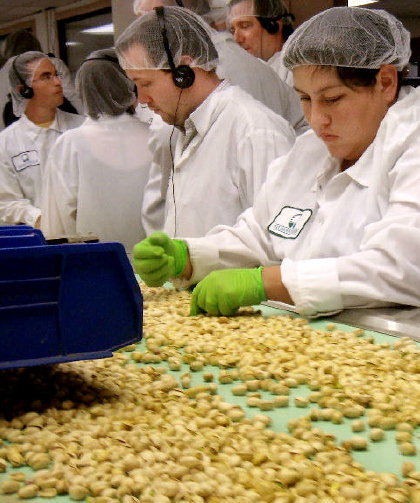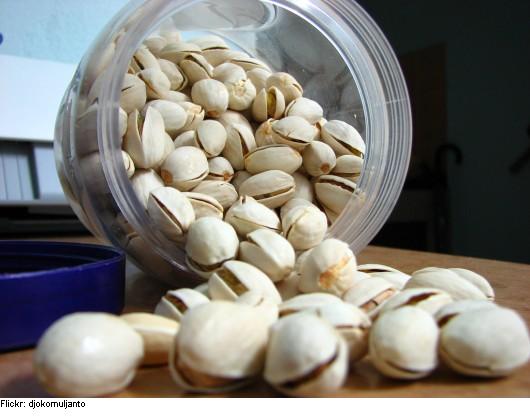Below are excerpts from a warning letter to Stewart Resnick, owner, The Wonderful Company based in Los Angeles, Calif., from the U.S. Food and Drug Administration.
From March 8th through April 7th, 2016, investigators from the United States Food and Drug Administration (FDA) conducted an inspection of your pistachio manufacturing process at your facility located at 13646 Highway 33, Lost Hills, CA 93249. The inspection was conducted in response to a multi-state outbreak of 11 human infections with Salmonella Montevideo (9 cases) and Salmonella Senftenberg (2 cases)) in nine states. Based on traceback and epidemiological evidence taken together with inspectional evidence, we have concluded that pistachio nuts produced by your firm are adulterated within the meaning of 21 U.S.C. 342(a)(1) of the Federal Food, Drug, and Cosmetic Act (the Act) [21 U.S.C. § 342(a)(1)] in that they bear or contain Salmonella, a deleterious substance which may render them injurious to health, and within the meaning of 21 U.S.C. 342(a)(4) of the Act [21 U.S.C. § 342(a)(4)], in that they were prepared, packed, and held under insanitary conditions whereby they may have been rendered injurious to health.
Our investigators’ observations were noted on Form FDA-483, Inspectional Observations, which our investigators issued to you at the conclusion of the inspection. You may find a copy of the Act and the regulations promulgated under the Act by following links at www.fda.gov.
Based on collaborative epidemiological and investigational efforts between the FDA, CDC, and the California Department of Public Health, we conclude that pistachio nuts produced by Wonderful Pistachios & Almonds, LLC were linked to this outbreak of Salmonella infections. Ten of the eleven individuals infected with Salmonella were available for interview, and eight of the ten (80 percent) reported eating pistachios during the week before illnesses onset, five of whom reported eating Wonderful brand pistachios. By comparison, a review of data from the 2006-2007 FoodNet Population Survey, which provides information about food consumption among the general population, suggests that only 12% of consumers would have been expected to consume pistachios in a weeklong period. CDC evaluated the probability of case-patients reporting this exposure among a sample of 10 persons and found significance when four or more case-patients report the exposure. No other food specific food was identified as a suspect vehicle.
 After reviewing the epidemiological evidence, we inspected your facility and collected three product samples at your firm, each consisting of 30 subsamples. Five of 30 subsamples of one sample of raw in-shell pistachios we collected from your silos yielded four positive tests for Salmonella Senftenberg and one for Salmonella Liverpool. Whole genome sequencing determined that the Salmonella Senftenberg isolates were nearly identical to isolates from case patients involved in the outbreak. The most probable number in these subsamples ranged from less than 3 to 23 Salmonella cells/gram.
After reviewing the epidemiological evidence, we inspected your facility and collected three product samples at your firm, each consisting of 30 subsamples. Five of 30 subsamples of one sample of raw in-shell pistachios we collected from your silos yielded four positive tests for Salmonella Senftenberg and one for Salmonella Liverpool. Whole genome sequencing determined that the Salmonella Senftenberg isolates were nearly identical to isolates from case patients involved in the outbreak. The most probable number in these subsamples ranged from less than 3 to 23 Salmonella cells/gram.
We acknowledge that you recalled product in response to this outbreak.
We acknowledge your written response to the Form FDA-483, dated April 19, 2016. In your response you proposed to study the optimal level of chlorine in the (b)(4) tank and to install a (b)(4) system to remove foreign material prior to conveying the pistachios into storage. However, you did not provide us with documentation demonstrating the effectiveness of these changes and any other changes you have made to prevent a reoccurrence of an outbreak.
This letter is not intended to be an all-inclusive list of violations at your facility. You are responsible for ensuring that your facility operates in compliance with the Act and all applicable regulations, including the CGMP regulations for food. You also have a responsibility to use procedures to prevent further violations of the Act and all applicable regulations.
You should take prompt action to correct the violations noted in this letter. Failure to promptly correct these violations may result in enforcement action by FDA without further notice, including, without limitation, seizure and/or injunction.
You should respond in writing within 15 working days of receipt of this letter describing the specific steps you have taken to correct the noted violations and to prevent these violations or other similar violations from occurring again. In your response, include documentation, including photographs, corrective actions you have taken to date, or other useful information that would assist us in evaluating your corrections. If you cannot complete all corrections within 15 working days, please state the reason for the delay and include a timetable for implementation of those corrections.
Section 743 of the Act (21 U.S.C. 379j-31) authorizes FDA to assess and collect fees to cover FDA’s costs for certain activities, including reinspection-related costs. A reinspection is one or more inspections conducted subsequent to an inspection that identified noncompliance materially related to a food safety requirement of the Act, specifically to determine whether compliance has been achieved. Reinspection-related costs means all expenses, including administrative expenses, incurred in connection with FDA’s arranging, conducting, and evaluating the results of the reinspection and assessing and collecting the reinspection fees (21 U.S.C. 379j-31(a)(2)(B)). For a domestic facility, FDA will assess and collect fees for reinspection-related costs from the responsible party for the domestic facility. The inspection noted in this letter identified noncompliance materially related to a food safety requirement of the FFD&C Act. Accordingly, FDA may assess fees to cover any reinspection-related costs.





.jpg) The editorial concludes that even though the Obama F.D.A. appears to be doing a better job, Congress needs to beef up the agency’s staff and broaden its recall authority. Longer term, Congress and the White House need to keep promises to take a deeper look at food safety. It is time to think seriously about establishing one federal agency to coordinate and enforce food-safety regulations — and give consumers the protections they need and deserve.
The editorial concludes that even though the Obama F.D.A. appears to be doing a better job, Congress needs to beef up the agency’s staff and broaden its recall authority. Longer term, Congress and the White House need to keep promises to take a deeper look at food safety. It is time to think seriously about establishing one federal agency to coordinate and enforce food-safety regulations — and give consumers the protections they need and deserve. Additionally, a joint inspection of Setton’s plant by the FDA and the California Department of Public Health found that Setton employees often used the same transport bins, conveyors and packing machines for both raw and roasted pistachios. Kraft suggested
Additionally, a joint inspection of Setton’s plant by the FDA and the California Department of Public Health found that Setton employees often used the same transport bins, conveyors and packing machines for both raw and roasted pistachios. Kraft suggested .jpg)
 Workers at one of Kraft’s manufacturers in Illinois turned up a contaminated batch of fruits and nuts in December 2007. Then, in September of last year, another positive sample appeared.
Workers at one of Kraft’s manufacturers in Illinois turned up a contaminated batch of fruits and nuts in December 2007. Then, in September of last year, another positive sample appeared. This time it’s pistachios. On March 30,
This time it’s pistachios. On March 30,  David Acheson, FDA associate commissioner, said,
David Acheson, FDA associate commissioner, said, The press release from the
The press release from the